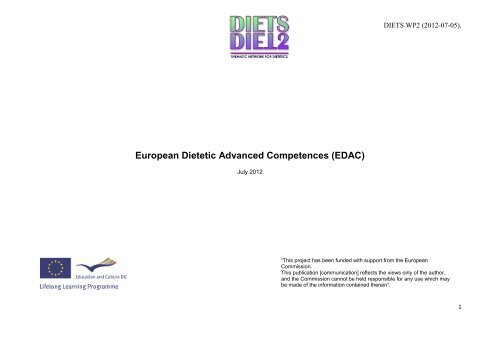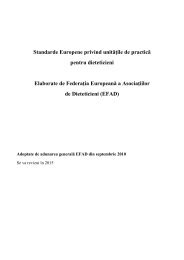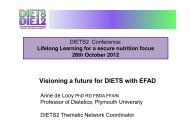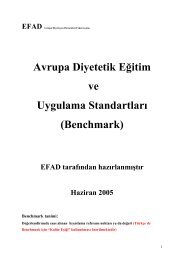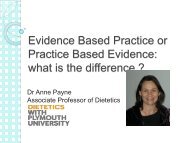European Dietetic Advanced Competences (EDAC) - Diets
European Dietetic Advanced Competences (EDAC) - Diets
European Dietetic Advanced Competences (EDAC) - Diets
You also want an ePaper? Increase the reach of your titles
YUMPU automatically turns print PDFs into web optimized ePapers that Google loves.
DIETS WP2 (2012-07-05).<br />
<strong>European</strong> <strong>Dietetic</strong> <strong>Advanced</strong> <strong>Competences</strong> (<strong>EDAC</strong>)<br />
July 2012<br />
“This project has been funded with support from the <strong>European</strong><br />
Commission.<br />
This publication [communication] reflects the views only of the author,<br />
and the Commission cannot be held responsible for any use which may<br />
be made of the information contained therein“.<br />
1
DIETS WP2 (2012-07-05).<br />
This document is aimed to dietitians in Europe and written by the Work Package „Second and third cycle competences for dietitians‟ of the<br />
Thematic Network of Dietitians (DIETS2, www.thematicnetworkdietetics.eu). The document will help us to better understand the competences<br />
required by dietitians who work or will work at advanced/ specialist level in Europe.<br />
The paper is arranged as follows:<br />
‣ Introduction<br />
‣ Glossary of Terms<br />
‣ Proposed <strong>Advanced</strong> Competence Framework<br />
Introduction<br />
Going from a newly qualified dietitian to an advanced level requires higher levels of knowledge and skills, as it includes significantly more<br />
demanding and complex work together with higher levels of responsibility and professional judgment. One of the <strong>European</strong> Federation of the<br />
Associations of Dietitians (EFAD) goals is to support the National <strong>Dietetic</strong> Associations (NDA‟S) to reduce inequalities and improve nutritional<br />
health in Europe. Part of this includes developing standards of competence at different levels of dietetic practice.<br />
In 2009, EFAD adopted the <strong>European</strong> <strong>Dietetic</strong> <strong>Competences</strong> and Performance Indicators (PIs) at a threshold level for entry into the profession<br />
(EFAD, 2005, www.efad.org ). Thereafter the profession and higher education institutions (HEI) in Europe began a process to ensure that all<br />
dietitians qualifying from their programmes have achieved these competences.<br />
The <strong>European</strong> Union is committed to the prevention and control of non-communicable diseases (EC 2007 & 2011) through more healthful nutrition<br />
and increased physical activity. Dietitians as nutrition experts can further advance their profession, their professional expertise and, working as<br />
autonomous professionals, support their user groups and other healthcare professionals regarding healthful human nutrition.<br />
Within the current context of Europe, the development of competence statements for dietitians post-qualifying is therefore highly relevant and<br />
important for the profession to support the achievement and implementation of these Resolutions and White papers. In additional and bearing in<br />
mind that the key ambitions of the Thematic Network for Dietitians (DIETS2) are:<br />
To prepare dietitians to be able to undertake and evaluate health promoting interventions and publish findings (enquiry led-learning)<br />
To support dietitians to develop and use contemporary communication and pedagogic/education methods (ICT)<br />
To enable dietitians to continually enhance their own expertise and relevance through lifelong learning (LLL)<br />
This paper defines the competences highly qualified dietitians should be able to reach after “some years” of practical experience combined with<br />
continued education and other experiences of Lifelong Learning (LLL). Practical work experience is essential to improve competence, but years in<br />
practice are not enough by themselves to reach advanced level. How a dietitian works and what LLL-experiences the individual chooses to<br />
undertake will be crucial in the process (see Figure 1). It is possible to work many years as an adequate and competent dietitian without reaching<br />
advanced level.<br />
2
DIETS WP2 (2012-07-05).<br />
Meeting the <strong>European</strong><br />
Academic and Practitioner<br />
Standards for <strong>Dietetic</strong>s<br />
(EDBS).<br />
1) Practical work experience<br />
(“reflective practice”), maybe<br />
leading to specialisation<br />
2) Academic education (i.e.<br />
post-graduate courses/<br />
modules at master and<br />
doctorate level)<br />
3) Other Lifelong Learning<br />
Meeting the <strong>European</strong> <strong>Dietetic</strong><br />
<strong>Advanced</strong> Competence (<strong>EDAC</strong>)<br />
Figure 1. Flowchart over the progression from newly graduated dietitian to a dietitian practicing at advanced level, indicating standards to be met at the two<br />
levels and the experience required to reach the higher level.<br />
3
DIETS WP2 (2012-07-05).<br />
An advanced practice or specialist dietitian will be one who is able to demonstrate they meet the advanced competence standards by drawing on<br />
a wide range of evidence. The evidence can be gained from professionally recognized programmes of study, for example a degree at Masters<br />
level or equivalent, or by using a competency-based assessment process. Other approaches may also be used to demonstrate commitment to<br />
evidence-based practice to meet the advanced competence standards.<br />
Exactly which of the competences described in this <strong>EDAC</strong>-document a dietitian has to reach and which performance indicators (PIs) they have to<br />
be able to show before being regarded as working at advanced level will be determined by their National <strong>Dietetic</strong> Associations (NDAs) and<br />
national legislation. The <strong>EDAC</strong>-document also provides a benchmark for monitoring development of the profession in Europe as opportunities are<br />
introduced for Lifelong Learning. It also presents a challenge to Higher Education, the Professional Bodies and individual learners to consider how<br />
they can support, through educational programmes and more informal means, the advancement of their colleagues, learners and themselves.<br />
Acknowledgment<br />
The authors of this paper gratefully acknowledge the use of several competence statements from the publications listed at the end of this paper.<br />
Glossary of terms<br />
<strong>Advanced</strong> practice<br />
(practice at<br />
advanced level)<br />
<strong>Advanced</strong><br />
practitioner/specialist<br />
<strong>Advanced</strong> practice can take place in either a general or a specialist field. Terms associated with advanced practice are<br />
„higher levels of knowledge and skill‟, „significantly more demanding‟, „higher levels of responsibility and judgment‟, „more<br />
complex procedures‟ etc. <strong>Advanced</strong> practice is underpinned by advanced reasoning.<br />
<strong>Advanced</strong> practice results from an expanded and specialized knowledge set, skills, competence, and experience.<br />
Expansion refers to the acquisition of new practice knowledge and skills, including the knowledge and skills that<br />
legitimize role autonomy within areas of practice that may overlap the traditional boundaries within dietetics practice.<br />
<strong>Advanced</strong> level practice is characterized by the integration of a broad range of unique theoretical, research-based, and<br />
practical knowledge that occurs as a part of training and experience beyond entry level and is shaped by the context in<br />
which the dietitian practices (ADA).<br />
Denotes a level of practice, often within a specialty, that is more advanced than the competences associated with initial<br />
registration, or with simply working in a specialty requiring different approaches (e.g. primary care at community level,<br />
elder care, rehabilitation homes or in hospital). The specialist‟s role encompasses professional expertise, teaching,<br />
evaluation and practice/service development. In some countries in Europe a title Specialist Dietitian has been proposed<br />
or implemented for dietitians working as advanced practitioners in an area of specialisation. A specialist may also be<br />
considered an expert.<br />
4
DIETS WP2 (2012-07-05).<br />
Competence<br />
Competency(ies)<br />
Dietitian<br />
A competence defines WHAT a person is capable of doing well, effectively and following professional standards<br />
- competence is an outcome: it describes what someone can do. It does not describe the learning process which<br />
the individual has undergone<br />
- in order to reliably measure someone‟s ability to do something, there must be clearly defined and widely<br />
accessible standards through which performance is measured and accredited;<br />
- competence is a measure of what someone can do at a particular point in time. (UDACE 1989: Tight 1996)<br />
The focus is concentrated on the learners and their actions rather than upon predetermined products or it can mean<br />
active participation through learning (Smith 1996, 2005). Learning programmes (in Higher Education or elsewhere) are<br />
therefore competency based programmes. Programmes in Europe will use the Dublin Descriptors (Bologna, 2004) to<br />
guide their development.<br />
The <strong>European</strong> Federation of the Associations of Dietitians (EFAD) and the International Congress of <strong>Dietetic</strong><br />
Associations (ICDA) define a dietitian is a person with a legally recognised qualification (in nutrition and dietetics) who<br />
applies the science of nutrition to the feeding and education of groups of people and individuals in health and disease.<br />
Administrative dietitian<br />
Clinical dietitian<br />
General dietitian<br />
Public health or<br />
community dietitian<br />
A dietitian with an education in nutrition and dietetics focused on food service management<br />
with responsibility for feeding of groups of people in health and disease in an institution or a<br />
community.<br />
A dietitian with an education focused on clinical nutrition and dietetics with responsibility for<br />
dietary prevention and treatment of groups and individuals in an institution or a community.<br />
A dietitian with a basic education (but not a specialisation) in both clinical nutrition and<br />
dietetics and food service management with overall responsibilities for both aspects in an<br />
institution or a community.<br />
A dietitian directly involved in health promotion and policy formulation that leads to the<br />
promotion of food choice amongst individuals and groups to improve or maintain their<br />
nutritional health and minimize risk from nutritionally derived illness.<br />
Expert<br />
Performance<br />
An expert is a person with extensive knowledge, skills or ability based on research and experience in a particular area of<br />
study i.e. <strong>Dietetic</strong>s.<br />
The performance indicator (PI) tells HOW a person performs a specific activity.<br />
5
DIETS WP2 (2012-07-05).<br />
indicator (PI) - A „PI‟ is a tool to assess a person‟s ability to perform a specific task<br />
- The PI‟s enable assessment of a person‟s performance in range of tasks that contribute towards a defined<br />
competence.<br />
- Together the PI‟s specify the level of performance required to achieve and define a Competence<br />
Proficiency<br />
Specialisation/field<br />
of interest<br />
Ability to adapt and apply knowledge and skills over a wide range of situations<br />
Specialisation is focusing to part of the field of dietetics (eg, administrative dietetics, ambulatory care, long-term care,<br />
diabetes, renal, paediatric, private practice, public health, nutrition support, research, sports nutrition).<br />
The dietitian may work at a basic or advanced level within the specialised field but to achieve advanced status the<br />
criteria for <strong>European</strong> <strong>Dietetic</strong> <strong>Advanced</strong> Competence must be demonstrated.<br />
6
DIETS WP2 (2012-07-05).<br />
Proposed Competence Framework<br />
The <strong>European</strong> <strong>Dietetic</strong> <strong>Advanced</strong> <strong>Competences</strong> (<strong>EDAC</strong>) provide the baseline of knowledge, skills, understanding and competence of a Dietitian<br />
working as a dietetic practitioner at advanced and specialist level in Europe.<br />
The <strong>European</strong> <strong>Dietetic</strong> Academic and Practitioner Standards (2005) recognised the major fields of Dietitians employed in Europe. However<br />
working at advanced and/or specialist levels will require the dietitian to be flexible, innovative and a proactive leader who integrates high-level<br />
nutrition and dietetic skills to influence the health of the community. At this level it is inappropriate to specify particular competences for every<br />
specialist area eg renal or diabetes, although some competences will be more applicable to some specialist areas than others. Over time it may<br />
be appropriate for specialist groups of dietitians to augment these <strong>EDAC</strong> standards with specifics from their own specialty to legitimize role<br />
autonomy. Examples are provided using the following colour notations:<br />
Generic <strong>Advanced</strong> <strong>Dietetic</strong>s – black text – applicable for all Dietitians in all working environments<br />
Specific to Administrative <strong>Dietetic</strong>s – identified by blue text<br />
Specific to Clinical <strong>Dietetic</strong>s – identified by red text<br />
Specific to Public Health or Community <strong>Dietetic</strong>s – identified by green text<br />
It is recognised that where highly specialised roles are undertaken e.g. in paediatric or renal disease dietetics more specific competences will be<br />
added. It is also recognised that although some competences are colour coded this does not mean that only a specific named working<br />
environment defines the dietitian‟s competence.<br />
Some Member States may wish to set their competence standards (or standards of proficiency) at a higher<br />
level for their Dietitians. These competences are set at a baseline level for dietitians working at advanced level.<br />
7
DIETS WP2 (2012-07-05).<br />
Competence<br />
Performance<br />
indicators<br />
1.0 <strong>Advanced</strong> knowledge and understanding of <strong>Dietetic</strong>s<br />
Constantly interprets knowledge base to display a deep and systematic understanding of the theoretical and<br />
methodological approaches to a relevant field of dietetic practice and through this advances professional dietetics.<br />
Knowledge, skills and application applicable to all field of dietetics<br />
a) Demonstrates an extensive depth and breadth of knowledge in a defined area or specialist field of dietetic<br />
practice<br />
b) Maintains a critical knowledge of up-to-date best practice guidelines and best policy statements<br />
c) Applies advanced knowledge to synthesis new and innovative theories and approaches, demonstrating<br />
originality and leadership in dietetic practice<br />
d) Demonstrates high level skill in the application of knowledge to complex dietetic matters and specific dietetic<br />
approaches to affect the eating behaviour of an individual within his/her environment and communicates this in<br />
an easily understandable way. Demonstrates a deep knowledge and understanding of health inequalities when<br />
deciding how to develop methods for supporting or providing dietetic interventions to individuals or groups.<br />
e) Has a critical knowledge of nutritional screening and assessment tools adapted to specific client groups<br />
f) Demonstrates a systematic understanding of the relevant government legislation as it affects dietetic practice<br />
Additional performance indicators specific to administrative dietitians:<br />
g) Demonstrates a systematic understanding of the relevant government legislation and different meal service<br />
systems to plan, produce and serve meals according to laws, regulations and policies (blue)<br />
h) Has an extensive knowledge and critical understanding of dietetic and catering practices that influence hygiene<br />
and traceability to improve service standards (blue)<br />
Additional performance indicators specific to clinical dietitians:<br />
i) Has an extensive knowledge and critical understanding of complex co-morbidities, social inequalities and food<br />
choice to justify dietetic action, in relevant dietetic settings (red)<br />
8
DIETS WP2 (2012-07-05).<br />
Competence<br />
Performance<br />
indicators<br />
2.0 <strong>Dietetic</strong> Process and Professional Reasoning<br />
2.1 Demonstrates an ability to reflect on own practice to synthesis innovative solutions, applications and ideas<br />
2.2 Creatively applies knowledge of the <strong>Dietetic</strong> Process in complex situations, unpredictable or unfamiliar contexts<br />
and, where appropriate, in a specialist context<br />
Knowledge, skills and application applicable to all field of dietetics<br />
a) Able to manage complex problems and case-loads creatively, through rapid assessment and synthesis of<br />
information within the practice context<br />
b) Shows a critical awareness and understanding of competing patient/client priorities when dealing with complex<br />
cases within a particular field of dietetic practice<br />
c) Able to apply a critical ethical dimension to practice to justify strategies adopted for the prevention of health<br />
inequalities<br />
d) Demonstrates the use of advanced skills in advocacy and negotiations in dietetic practice<br />
e) Understands and applies biostatistics where relevant to a specialist field and is able to apply this in practice<br />
f) Able to make unpopular but evidence-based appropriate decisions<br />
g) Understands and values cultural preferences, health beliefs and behaviours and challenges inequalities<br />
h) Critically evaluates own practice and systematically draws on published evidence to inform practice and justify<br />
the rationale for an innovative dietetic approach<br />
i) Employs critical evaluation to assess progress, impact and outcomes of nutrition interventions<br />
j) Applies high level critical reasoning to monitor the effectiveness of dietetic care to provide evidence that the<br />
nutrition plan/intervention is achieving planned outcomes thereby justifying any further action<br />
Additional performance indicators for clinical dietitians:<br />
k) Synthesizes best available evidence to inform and prioritizes the nutrition diagnoses based on the severity of<br />
problem, the likelihood that nutrition intervention will impact the problem, and patient‟s perception of<br />
importance. (red)<br />
9
DIETS WP2 (2012-07-05).<br />
l) The ability to demonstrate an „extended intervention role as appropriate to the specialist area of advanced<br />
practice (red)<br />
Additional performance indicators for public health dietitians:<br />
m) Able to integrate, synthesize and communicate knowledge about structures in public health and social services<br />
at local, national, <strong>European</strong> and international level to justify strategies adopted for prevention of health<br />
inequalities (green)<br />
n) Able to operate in an unpredictable and complex environment to promote and apply the local governance<br />
agenda to dietetic practice (green)<br />
o) Apply a critical understanding of the value of epidemiological information, especially that which is based on<br />
local data, when planning care (green)<br />
Competence<br />
Performance<br />
indicators<br />
3.0 Professional Relationships<br />
Demonstrates advanced communication skills to engage effectively in professional relationships with clients,<br />
professional colleagues, policy and decision makers in a variety of settings, to establish clear and appropriate actions<br />
and outcomes.<br />
Knowledge, skills and application applicable to all field of dietetics<br />
a) Exhibits a deep awareness of cultural diversity with recognition that cultural differences enrich <strong>Dietetic</strong> practice<br />
and also demonstrates equality of care<br />
b) Acts as role model for personal conduct when dealing with diversity and difference; educates, advises and<br />
guides less experienced team members and other stakeholders<br />
c) Identifies and manages ethical dilemmas that arise within professional relationships and ensures ethical<br />
principles (see EFAD or national ethical guidelines) are adhered to within own practice<br />
d) Encourages, inspires and works with others; actively seeking collaboration for inter-disciplinary work<br />
e) Has local, national, (international), and policy-making network connections in the <strong>Dietetic</strong> and related fields<br />
f) Seeks opportunities to engage in the management of networks to promote professional practice through<br />
enhanced communication<br />
10
DIETS WP2 (2012-07-05).<br />
g) Works as an effective member of a multi-professional/multi-agency team (eg medical, social, private enterprise<br />
and public bodies) contributing to evidence-based practices and policies of the team<br />
h) Can apply skills in counselling and interview techniques e.g. motivational, to support and influence people that<br />
dietitians work with including patients/clients, other health care professionals and co-workers<br />
Additional performance indicators for clinical dietitians:<br />
i) Creates a climate of mutual trust and establishes partnerships with patient/clients, carers and families to<br />
encourage active choices and participation in care and treatment (red)<br />
j) Demonstrates the flexibility to provide support when a need is identified and a sensitive awareness of the<br />
clients need for autonomy when less support is appropriate (red)<br />
k) Demonstrates advanced communication skills to practice a client-centred approach, including knowledge of<br />
client´s expectations and respect for individual differences and their influence on dietary and lifestyle habits (red)<br />
Competence<br />
Performance<br />
indicators<br />
4.0 Professional Autonomy and Accountability<br />
Demonstrates the ability to apply own initiatives to decision making and problem solving, within ethical and professional<br />
guidelines, accepting full accountability for outcome of own actions.<br />
Knowledge, skills and application applicable to all field of dietetics<br />
a) Constantly uses personal reflection to evaluate self-performance and demonstrate advancement to dietetic<br />
practice<br />
b) Has pro-active role in recognition of mal-practice and is partner in decisions regarding mal-practice<br />
c) Demonstrates responsibility for own professional development by actively engaging in Life Long Learning to<br />
support advancing dietetic practice<br />
d) Creates a culture of continuing development within own workplace through acting as a role model for others<br />
e) Reflects on skills and creates opportunities to own further development<br />
f) Leads on the development of local, national and international policies, regulations and codes of ethics for<br />
Dietitians to promote professional excellence<br />
11
DIETS WP2 (2012-07-05).<br />
Additional performance indicators for clinical dietitians<br />
g) Demonstrates autonomous practice and full accountability for the care of clients, in assessment, clinical<br />
reasoning, treatment and intervention by maintaining clear, accurate and timely records of practice (red)<br />
Competence<br />
Performance<br />
indicators<br />
5.0 Educator Skills<br />
5.1 Demonstrates responsibility to contribute to the education and training of patients/clients, students, dietitians, and<br />
other health professionals.<br />
5.2 Demonstrates ability to prepare and present educational material through the critical evaluation and synthesis of<br />
relevant information to meet learning outcomes in appropriate settings and using effective media.<br />
Knowledge, skills and application applicable to all field of dietetics<br />
a) Has an extensive knowledge and critical understanding of effective educational methods and pedagogy to<br />
influence the behaviour of individuals and groups, as well as students and other professionals<br />
b) Uses educational techniques to empower patients/clients, students, professionals and other people to identify<br />
their potential and seek out opportunities to improve nutritional health and reduce inequalities<br />
c) Ensures that individuals are encouraged and supported, wherever possible, to be self-sufficient in managing<br />
their own educational or health related needs<br />
d) Facilitates learning in practice, mentoring and coaching to promote a positive learning environment for students<br />
and other relevant professionals<br />
e) Able to perform a systematic literature review to critically appraise current evidence and synthesize an<br />
informed strategy, to teach best practice for a specific dietetic question<br />
f) Creates a culture of challenge and support where critical feedback is received positively and mistakes are<br />
regarded as learning opportunities<br />
g) Provides positive critical feedback, coaches team members to enhance their performance and clarify their roles<br />
and responsibilities<br />
h) Initiates, manages and demonstrates exemplary supervisory skills within dietetic practice and supports the<br />
development of supervision skills in others (students, colleagues and other professionals)<br />
12
DIETS WP2 (2012-07-05).<br />
Competence<br />
Performance<br />
indicators<br />
Competence<br />
Performance<br />
indicators<br />
6.0 Research and Development in <strong>Dietetic</strong>s and its Science<br />
6.1 Demonstrates a critical understanding of methodological approaches to scientific investigation and skills necessary<br />
for evidence informed practice.<br />
6.2 Enables the design and implementation of a substantial audit or research project to address and inform significant<br />
and specific areas of practice.<br />
Knowledge, skills and application applicable to all field of dietetics<br />
a) Able to critically reflect on current literature in a defined area or specialist field of practice, to develop relevant<br />
research questions<br />
b) Able to perform a systematic literature review to critically appraise current evidence and synthesize an<br />
informed strategy, to implement evidence-based best practice for a specific dietetic question<br />
c) Demonstrates the application of skills of enquiry and a systematic research approach to problem solving,<br />
identifying solutions and promoting development in dietetics<br />
d) Has a critical knowledge and understanding of methods of research enquiry, project design and data analysis<br />
to enable service evaluation and evidence informed practice through research and audit<br />
e) Engages actively in research projects within the dietetic field<br />
f) Engages in writing professional, reasoned and scientific articles for peer reviewed journals within the dietetic<br />
field<br />
7.0 Leadership and management of professional dietetics<br />
Demonstrates effective leadership and management skills of self and others through support and promotion of team<br />
dynamics, recognition of excellence in others and an ability to resolve conflict before it escalates.<br />
Knowledge, skills and application applicable to all field of dietetics<br />
a) Recognizes the need to strategically manage change, taking account of organizational and service delivery<br />
needs<br />
b) Demonstrates an ability to integrate skills in leadership and management with resources (financial, human,<br />
physical and/or material resources) to prioritize and manage complex and conflicting priorities, to handle<br />
13
complex problems<br />
DIETS WP2 (2012-07-05).<br />
c) Demonstrates management skills especially with respect to risk management and financial security, budgetary<br />
and resource management<br />
d) Sets expectations and procedures for delivery of service and advises peers and less experienced members of<br />
staff on expectations and procedures<br />
e) Creates and effectively communicates a vision, core values, institutional and disciplinary policy/practice, and<br />
strategy for successful service development and dietetic promotion<br />
f) Complies with human resource policies / procedures and collective agreements in managing the performance<br />
of others. May include: employees, dietetic interns, students, volunteers, teams<br />
g) Sets challenges to build and develops confidence in others and manages the over-confident<br />
Competence<br />
Performance<br />
indicators<br />
8.0 Entrepreneurial skills and business development of dietetics<br />
Demonstrates ability to apply a high level of critical thinking and innovation to develop new concepts and approaches<br />
for identified opportunities within a „business‟ environment using dietetics and nutrition.<br />
Knowledge, skills and application applicable to all field of dietetics<br />
a) Undertakes analysis to understand the user requirements and creates a plan, strategy or policy taking due<br />
account of the ethical responsibilities of the dietitian<br />
b) Fosters a culture of enquiry that is supportive and facilitative, encouraging creativity and innovation<br />
c) Performs advanced organizational and strategic service planning to implement reasoned service delivery<br />
d) Is influential in setting standards and devising criteria to define the skills required of dietitians in different fields<br />
e) Ensures that a dietetic perspective is achieved in the multi-professional/multi-agency delivery of care<br />
f) Uses health management skills to affect health policies locally, nationally and internationally<br />
14
DIETS WP2 (2012-07-05).<br />
References<br />
Bologna Process (2004) in <strong>European</strong> Qualifications Framework; National Qualifications Framework, Higher Education State of Play<br />
http://www.eucen.eu/EQFpro/GeneralDocs/FilesFeb09/STATEofPLAY.pdf (accessed April 2012)<br />
BDA (2010) <strong>Dietetic</strong> Career Framework. The British <strong>Dietetic</strong> Association, UK.<br />
<strong>European</strong> Commission (2011) http://www.europarl.europa.eu/sides/getDoc.do?pubRef=-//EP//NONSGML+MOTION+B7-2011-<br />
0489+0+DOC+PDF+V0//EN )<br />
Hyland T (1993) Professionalism, competence and teaching in post-school education<br />
http://www.heacademy.ac.uk/assets/documents/resources/heca/heca_nv13.pdf (accessed March 2012)<br />
NHS (Scotland) (2010) Education and Development Frame work for Senior AHPs.<br />
http://www.nes.scot.nhs.uk/media/459117/senior_ahp_framework_december_2010.pdf (accessed April 2012)<br />
QAA (2010) Master’s degree characteristics. The Quality Assurance Agency for Higher Education, Gloucester, UK. www.qaa.ac.uk<br />
SEEC (2010) Credit level descriptors for Higher Education. Southern England Consortium for Credit Accumulation and Transfer.<br />
www.seec.org.uk<br />
Russell M, Stieber M, Brantley S, Freeman AM, Lefton J, Malone AM, Roberts S, Skates J and Young LS (2007) American Society for<br />
Parenteral and Enteral Nutrition and American <strong>Dietetic</strong> Association: Standards of Practice and Standards of Professional Performance for<br />
Registered Dietitians (Generalist, Specialty, and <strong>Advanced</strong>) in Nutrition Support. JADA 107: 1815-22<br />
Smith MK (1996, 2005) ‘Competence and competence’ the encyclopaedia of informal education. www.infed.org/biblio/b-comp.htm (accessed<br />
March 2012)<br />
Tight, M. (1996) Key Concepts in Adult Education and Training, London: Routledge.<br />
UDACE (Unit for the Development of Adult Continuing Education) (1986) The Challenge of Change – Developing Educational Guidance for<br />
Adults, Leicester.<br />
VITAE (2010) – Researcher Development Framework, Careers Research and Advisory Centre (CRAC) Limited. London<br />
The <strong>European</strong> Academic and Practitioner Standards for <strong>Dietetic</strong>s (EDBS) (EFAD, 2005, www.efad.org).<br />
<strong>European</strong> <strong>Dietetic</strong> competences and their performance indicators; first cycle (EFAD, 2009, www.efad.org)<br />
Glossary of the DIETS project (www.diets.org)<br />
Code of Ethics and Code of Good Practice for <strong>Dietetic</strong>s. (EFAD, 2008, www.efad.org)<br />
Initiatives to improve nutritional health in Europe; EC White paper, 2007; WHO, 2008 and EU Platform for action on Diet, Physical Activity and<br />
Health (http://ec.europa.eu/health/ph_determinants/life_style/nutrition/platform/platform_en.htm).<br />
15


